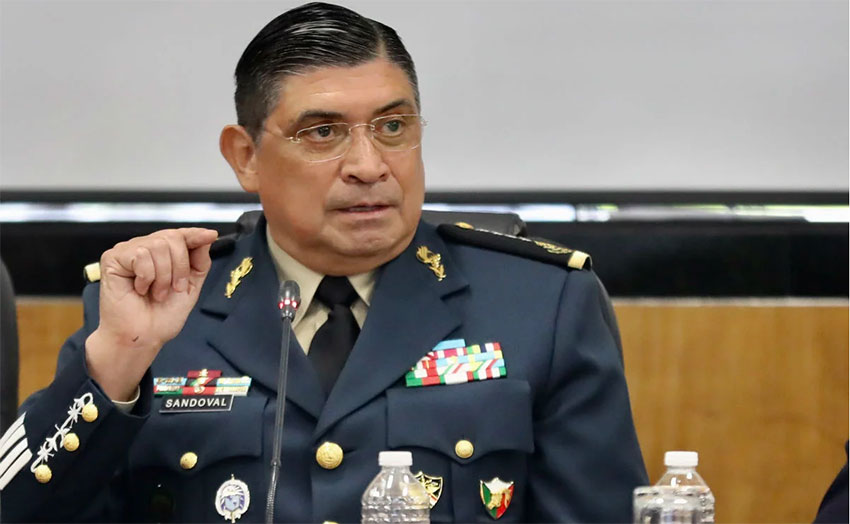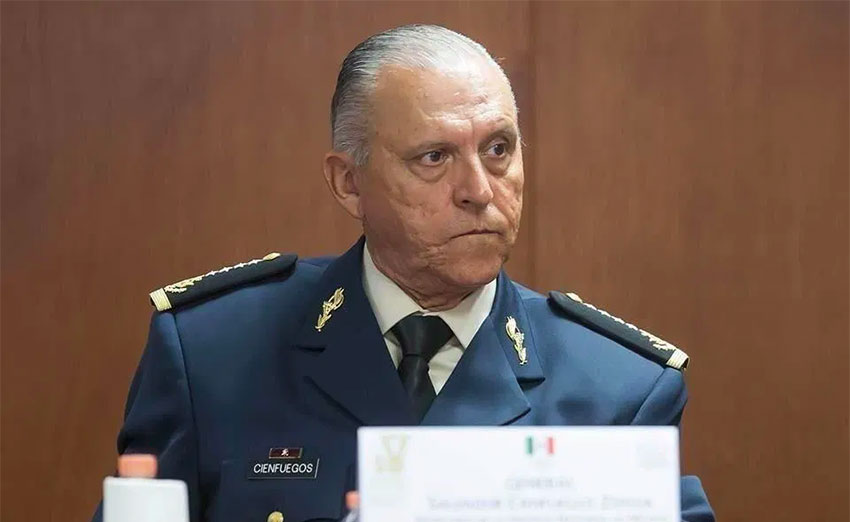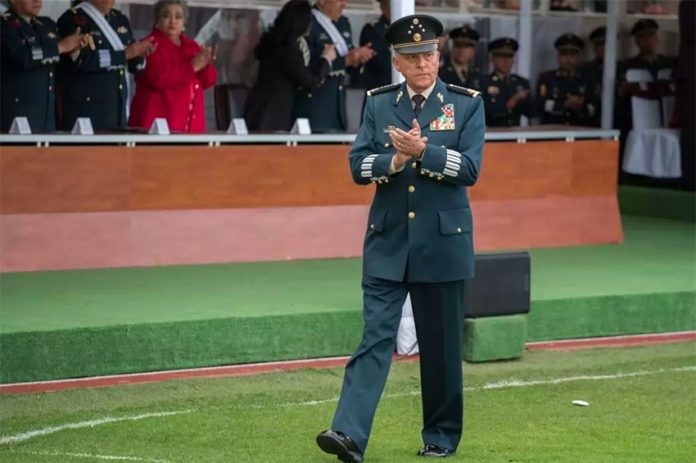A secret “brotherhood” of high-ranking army officials was instrumental in getting former defense minister Salvador Cienfuegos out of jail in the United States and securing his return to Mexico, according to a report by the news website Emeequis.
Cienfuegos, army chief in the 2012-2018 government led by former president Enrique Peña Nieto, arrived at the airport in Toluca, México state, on a private plane last night just hours after a United States federal judge agreed to a request from the U.S. Department of Justice to drop drug trafficking and money laundering charges against him so that he can be investigated in Mexico.
He spent just over a month in U.S. custody after being arrested at the Los Angeles airport on October 15.
The federal Attorney General’s Office (FGR) is conducting an investigation and has received evidence gathered by United States authorities. But the former defense minister doesn’t currently face any charges in Mexico and was allowed to return to his home after a health check and brief interview at the Toluca airport.
According to the Emeequis report, neither Foreign Minister Marcelo Ebrard nor Attorney General Alejandro Gertz Manero – who announced the decision to seek the dismissal of the charges against Cienfuegos in a joint statement with U.S. Attorney General William Barr – were ultimately responsible for obtaining the former army chief’s return ticket to Mexico.

It said that a “brotherhood” within the army called “El Sindicato” (The Syndicate) can in fact take the credit for Cienfuegos’ return as a free man.
Emeequis said that it was told by army sources that just a few hours after news broke of the former army chief’s arrest, a representative of El Sindicato – mainly made up of active and retired four-star generals – knocked on the door of the office of current Defense Minister Luis Cresencio Sandoval.
The representative, according to the sources, was a general who has experience combating drug cartels in the north of Mexico and a longstanding friendship with Sandoval.
One source told Emeequis that the message to the defense minister was: “The high-ranking commanders of the army were not going to remain with their arms crossed while a foreign government tore their credibility to shreds.”
The general told Sandoval to pass the message on to President López Obrador, making it clear that the high-ranking members of El Sindicato were not happy about the federal government not going to bat for their former colleague.
Emeequis said that in addition to generals, lieutenants and colonels began complaining that López Obrador appeared to be siding more with the United States Drug Enforcement Administration (DEA) than the powerful “brotherhood,” which according to the report “pulls strings” on crucial issues for the federal government, such as the deployment of the National Guard, the construction of the new Santa Lucía airport and the construction of the new refinery on the Tabasco coast.
When Cienfuegos was transferred to a prison in New York from Los Angeles, even the most patient army officials – people who had been calling for the president to be given more time to negotiate with U.S. authorities – were infuriated, the report said.
El Sindicato consequently increased its pressure on the government. Several more representatives of the organization visited Sandoval or spoke to him over the telephone to tell him to tell López Obrador that there was a risk that the discontent in the army could cause problems for the government.
The president then reportedly ordered Foreign Minister Ebrard to harden his tone in complaining to the United States about arresting Cienfuegos without informing the Mexican government, and told him to insist on having the former defense minister returned to Mexico given that he allegedly committed crimes here rather than in the U.S.
Ebrard told reporters on October 29 that Mexico had expressed its “profound discontent” to the United States over not being informed.
To support their demand that the former defense minister be sent back to Mexico, the FGR and the Ministry of Foreign Affairs told the United States that the federal government would reevaluate its future collaboration with the DEA, Emeequis said.
The Washington Post reported that prosecutors in the U.S. attorney’s office for the Eastern District of New York attributed the decision to drop charges against Cienfuegos to the Mexican government’s threats to limit the role of the DEA in Mexico.

“What was put on the table was the collaboration with the DEA,” an army source told Emeequis.
“In the end they [the U.S. authorities] had to give in because the bilateral relationship is more important for them than capturing a single individual as high ranking as he may be.”
Indeed, U.S. prosecutors said in a filing asking a judge to dismiss the charges against Cienfuegos that “the United States has determined that sensitive and important foreign policy considerations outweigh the government’s interest in pursuing the prosecution of the defendant.”
Still, the decision was unprecedented and a major shock given that the United States spent years collecting evidence that Cienfuegos colluded with the H-2 Cartel and has previously shown little faith in the Mexican justice system.
According to Emeequis, the United States agreed to return Cienfuegos under terms set out by El Sindicato – with all charges withdrawn and without seizing any of his assets or freezing his bank accounts.
The only “blemish” on the brotherhood’s plan is that the U.S. government has shared its evidence against the former defense minister with the FGR, the news site said.
However, there are doubts about whether much of the evidence obtained by U.S. authorities – specifically thousands of incriminating Blackberry messages they intercepted – will be admissible in Mexican courts because it was obtained in Mexico without the authorization of a judge.
Many analysts believe that Cienfuegos will never be tried in Mexico let alone go to jail despite the United States’ apparent confidence in the Mexican justice system and its assertion that it has a “strong” case against the former army chief.
“The chances of Cienfuegos being convicted in Mexico are slim to none,” said Mike Vigil, a former DEA chief of international operations.
“The idea that he could be publicly tried is ludicrous,” said Benjamin Smith, a professor at the University of Warwick and a Mexican drug trade expert. “He knows exactly where all the bodies are buried.”
Source: Emeequis (sp)
